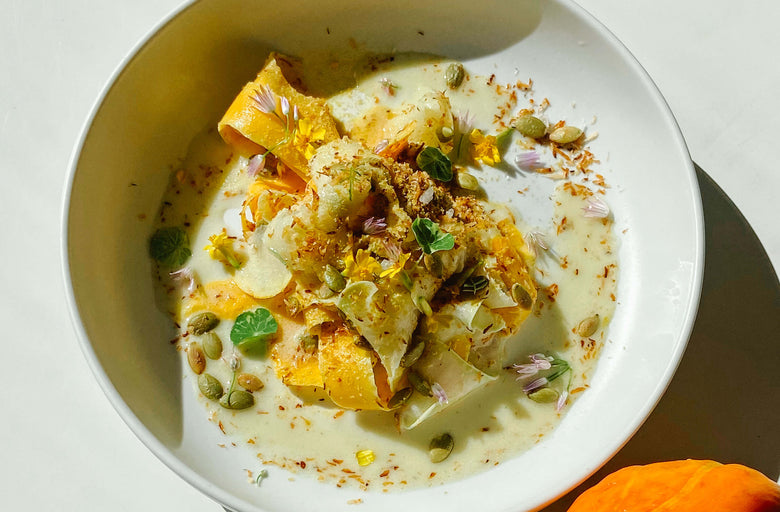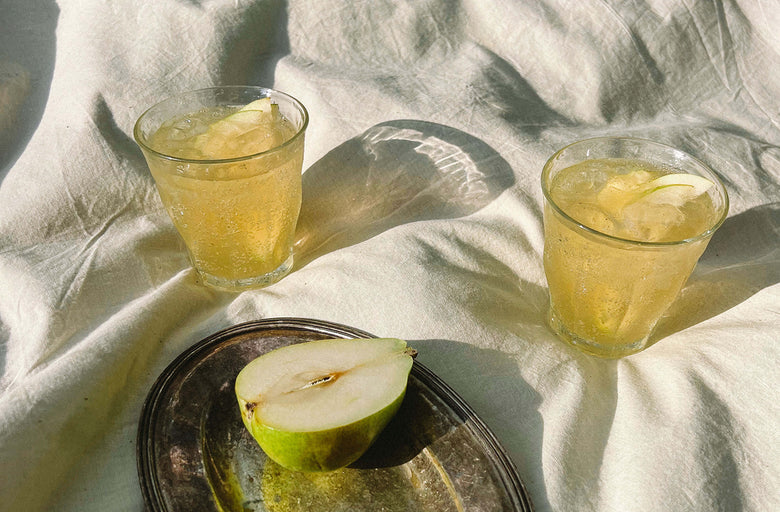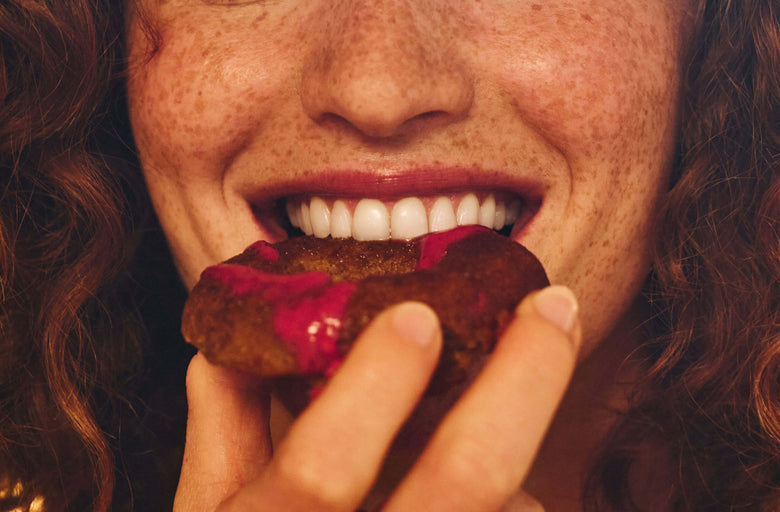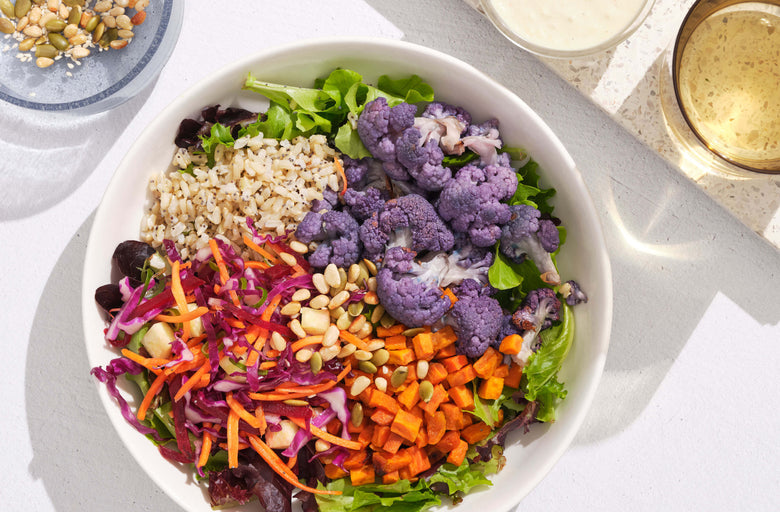“Creating life is about expansion in every way.”—Danielle Duboise
Pregnancy is a time of abundance, in which the limits of love we thought existed expands and grows as rapidly as our bodies, which change to accommodate the creation of new life. To help build your new cosmic being, your body goes into overdrive, sending all of the nourishment you fill it, straight to your baby––prioritizing its health and development.
During this season of life, your nutrient needs essentially double––after all, your body needs them too––but which nutrients in particular? We found ourselves asking a key question: how much is enough? What felt like “enough” before no longer applies––whether that’s leafy greens, antioxidants, vitamins, minerals, or even sleep. The good news is that the answer is simple––you need to treat your baby and body as equal entities, and prioritize giving them an abundance of love and nourishment in order to thrive. Here’s how:

BUILD A DIVINE HOMEBASE THROUGH NUTRITION AND SUPPLEMENTS
BEGIN WITH NUTRIENT-DENSE FOODS
When it comes to your nutritional needs, you want your cup to runneth over. It’s not a matter of “eating for two,” but rather, thinking of your baby as an extension of yourself, and making sure each part of your body is wholly nourished. After all, your body is now more than just what tethers you to Earth––it is literally a home, and you want to make it as warm and nurturing as possible for your growing baby.
Begin with organic foods––greens especially––and prioritize eating nutrient-dense, organic meals packed with fibrous greens, sulfurous veggies, and whole grains, to flood your body with the essential nutrients it needs. But also don’t be afraid of the occasional extra snack. “I eat Sakara every single day, “ says Danielle Duboise, Sakara founder and co-CEO, “Every doctor and medical professional on the planet would tell you pregnancy is a time to nourish with whole, clean foods and lots of plants. I fill up on these superfoods, minerals, phytonutrients, plant fiber and antioxidants, and listen to my body to know if I need more.”
SEEK PLANT SOURCES FOR A PLETHORA OF BENEFITS
The myth that you must rely on animal sources for proper nutrition is just that: a myth. After all, where do animals get their nutrients from? Go right to the plant source and receive the most bioavailable boosts of antioxidants, fiber, and phytonutrients—think: beans to nuts, leafy greens to seasonal fruit. Then, you’re able to not only eat more sustainably, but rely on sources you trust, and still provide your body with key nutrients in abundance including amino acids, DHA, and choline.
In fact, there are plenty of plant-based sources that are equally, if not more, potent, and naturally come with extra nutritional goodness. Take cruciferous leafy greens like kale; in addition to being an excellent source of vitamins K, A, and C, it's also rich in iron, potassium, and fiber.
FLOOD YOUR BODY WITH CRITICAL INGREDIENTS
As you go about strengthening your homebase and doubling your nutrient intake, be sure to prioritize these nutrients which are key for both you and baby.
CHOLINE: Key for fetal brain development during pregnancy, the amazing thing about choline is it can be passed through your breastmilk––meaning its benefits continue to nurture your baby long after you’ve given birth.
FOUND IN: Quinoa, collard greens, broccoli, Brussels sprouts, pinto beans, kidney beans, cauliflower
CALCIUM: If the first thing that comes to mind for calcium is a glass of milk, we've got news for you. The calcium in your bones and teeth likely came from stars, exploding supernovas that scattered the mineral across the universe. As you pass your own solar energy to your baby, be sure to replenish your calcium stores to keep your body strong.
FOUND IN: Broccoli, cabbage, okra, sesame seeds, chia seeds, almond butter, kale, oranges.
VITAMIN D: From supporting mental health to suppressing inflammation, there are few things, it seems, that vitamin D can’t do. Known as the sunshine vitamin, vitamin D should be a high priority during your pregnancy, as it not only works synergistically with calcium in growing your baby’s bones, but helps ensure you stay healthy by strengthening your immune system.
FOUND IN: Mushrooms and oranges.
you need to treat your baby and body as equal entities, and prioritize giving them an abundance of love and nourishment in order to thrive.
FOLIC ACID: Technically a B vitamin, folic acid helps your body in making blood cells, which you need plenty of during this time. Getting the right amount of folate is also important as it helps lower the risk of any neural tube defects.
However, some are unable to absorb folate or folic acid properly, due to the MTHFR gene mutation. In this case, you should look for prenatal supplements that have methylfolate, or folate in its methylated form, which can be absorbed and used properly even if you carry the gene mutation—it’s not a problem either way.
FOUND IN: Broccoli, Brussels sprouts, peas, chickpeas, and leafy greens like cabbage, kale, and spinach.
IRON: Of all the prenatal essentials, iron is perhaps at the top of our list, as it helps the body produce red blood cells, is vital for developing your placenta, and even helps to carry oxygen throughout the body. In a phrase, it helps breathe life through you and your baby.
FOUND IN: Dark, leafy greens like Swiss chard and kale, and legumes, including beans, peas and lentils.
IODINE: This semi-under-the-radar mineral always makes the cut for pregnancy essentials. Critical for your baby’s physical and cognitive growth, in your body, it helps maintain regular thyroid function, which in turn regulates the hormones that control metabolism, heart rate, and temperature, along with other intrinsic functions.
FOUND IN: Sea vegetables like dulse, kelp, arame, and nori.
DHA + EPA (Omega-3 fatty acids): Omega-3 fatty acids play an important role in your heart and brain health, as well as your baby’s cognitive development. They also help reduce inflammation and help balance your hormones––both of which are especially important right now.
FOUND IN: Chia seeds, hemp seeds, flaxseeds, walnuts, algae, chlorella, spirulina, nori, kidney beans
PROBIOTICS: An essential part of prenatal health is maintaining a balanced vaginal microbiome, as during birth, your baby comes directly into contact with those microbes, which are key for developing a healthy microbiome of their own. In fact, many doctors today even swab babies born via C-section with their mother’s microbiomes immediately following birth, to ensure they get that essential bacteria. Be sure to incorporate foods rich in probiotics or substitute with a probiotic to keep your microbiome balanced.
FOUND IN: Kimchi, fermented foods, kefir, black garlic
Look for bioavailable ingredients AKA forms that the body recognizes and therefore is able absorb and knows how to use.
GET SUPPORT FROM A CLEAN PRENATAL
While scientists agree that the best way to get your vitamins and minerals is through diet, sometimes things get in the way. For example, morning sickness and nausea (not to mention cravings) may make the very thought of eating a bowl of greens impossible, and those who follow a strict vegan diet without supplementation may not be getting enough essential omega-3 fatty acids or choline.
To ensure that you, your body, and your baby are adequately nourished, your doctor will most likely recommend supplementing with a prenatal.

HOW TO SHOP FOR A PRENATAL
On the market, prenatals are generally divided into three kinds: various cocktails of pills to take during fertility and conception, a single multivitamin for your three trimesters, and another entirely separate multivitamin to take after you’ve given birth. The result? Endless bottles lining your medicine cabinet that ultimately are never finished as, before you know it, you’ve moved on to another phase, complete with new dosages. Another problem with this method is that relegating nutrients to specific periods of time means that you may be missing out on other essential elements of prenatal nutrition.
COMPREHENSIVE
This is why we believe that your prenatal should be more than just pre- or postnatal: it should be comprehensive, more than a single multi, and you should be able to rely on the same, consistent supplements to support your body through all phases of your pregnancy journey––making for an easier to remember (not to mention more cost-efficient and sustainable) routine. We designed The Foundation: Prenatal for this very reason, to ensure that your body was getting all of the key nutrition it needed, in curated, convenient daily supplement packs.
CLEAN
While taking supplements may seem like an easy way to boost your health in general, the reality is that unfortunately, many dietary supplements on the market are full of fillers and additives, ingredients which not only dilute the pill’s potency, but can cause more harm than good.
When looking for a prenatal supplement, try to find one as clean as possible, made with ingredients that you recognize. Look for ones that explicitly don’t include fillers, additives, preservatives, colors, or flavors, and prioritize the quality of ingredients and sources. This is especially key for lightening your toxin load, which can otherwise threaten your health on a long-term basis.
Look for ingredients with food sources, or ones that are in their most bioavailable forms––AKA forms that the body recognizes and therefore is able absorb and knows how to use.
Additionally, seek out brands that are manufactured in cGMP facilities. cGMP stands for Current Good Manufacturing Practices, which means that a facility that is cGMP-certified follows these regulations for manufacturing that are enforced by the FDA, and meets their high standards for quality and purity.
SEEK FULL-SPECTRUM NUTRITION
Are There Hidden Nutrient Gaps in Your Diet?






